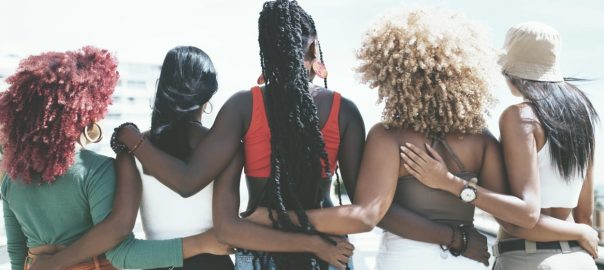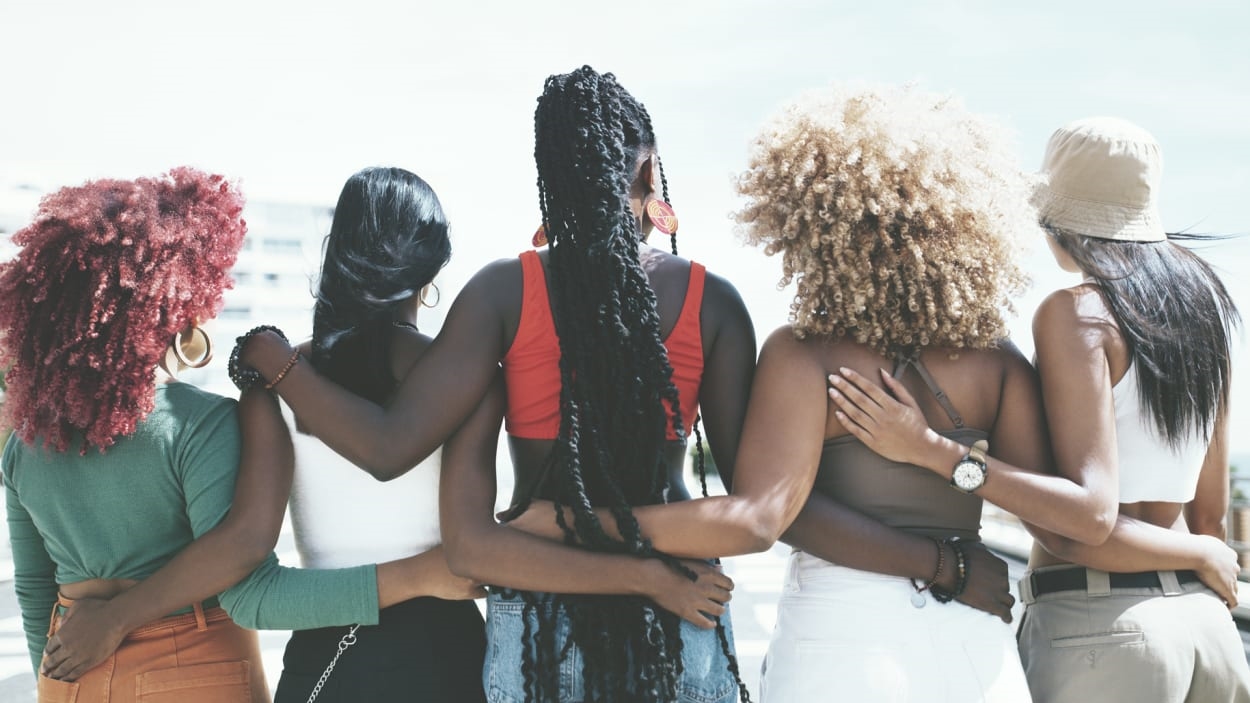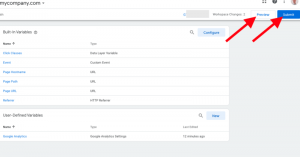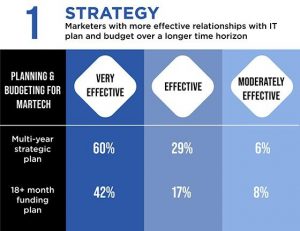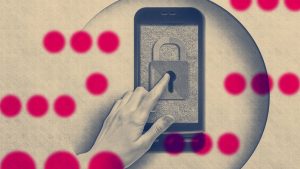By JinJa Birkenbeuel
It was spring of 2021, and the world was starting to wake up from COVID-19 lockdowns. I was about to head to my first public-facing entrepreneur workshop as a Google digital coach since I chopped off a foot and a half of 30-plus-years’-worth of chemically straightened processed hair. It was broad daylight. I was still working from home where my two-flat runs parallel to one of the busiest streets in Chicago.
My desk was centered in my front parlor room in front of a giant picture window, where drivers could pivot their gaze to see me sitting there with a frozen sales-y smile like the morning news anchor on WGN surrounded by ring lights.
There I was au naturel, feeling naked, raw, confused, and scared. I was showing up that day, representing my highly cultivated brand, Birk Creative, and Google’s trillion-dollar one—with a nappy, inelegant, unstyled, five-inch-high, wild and wooly afro. This was my first existential brand crisis.
My processed hair has defined my professional brand for over two decades. My straight hair always spoke in poetry and said, I am professional and excellent. I am pretty, I am safe, desired, and not like everyone else.
I was frozen, contemplating, thinking back to my roots. During the beginning of the pandemic, they had already started to grow fast and fat out of my head, and I was incessantly touching them with my fingertips. Someone once told me the constant scraping of my scalp with my fingers was because the Ancestors were reminding me of who I am.
It was still cold in the almost-springtime in Chicago, that space between beautiful green buds and Don’t complain because it will be negative 40 any minute and you’ll hate it here! When the already wrecked sidewalks rise up from under your spiked running shoes and become a sheet of black ice that will crack your back and split into shards whatever hope of summer you have left in your IG memories.
But it could be perfect timing to get out of the cold because I was about to go to the hot and crowded Black hair salon. A place where five hours of my vibrant natural life would permanently vanish, just so I can have someone make my hair look and feel and move as closely as possible to a white woman’s hair.
Snaps. Nappy. Your brother got the good hair. Why won’t your hair grow? Your hair can do so much, I wish I had your hair! Why is your Black hair all over the floor? Can I touch it?
Have you ever had a chemical placed in your hair that gave you third-degree burns on your scalp? Have you had the pungent, sizzling smell of lye take over your nostrils for a few hours so that you couldn’t taste your food for a while? Have you ever touched the oil that was placed on your edges near the thinnest skin on your temple and then the top of your ears only to have it drip down your neck staining your favorite T-shirt, all just to prevent permanent scarring from burn scabs created from the searing white liquid?
This is not natural. It’s not a natural process. It never has been. It never will be.
My earliest memory of my hair in its natural state was when I was sent to YMCA summer camp in Michigan for four straight weeks. I was the only Black girl there. My white-ish ’70s mom, who had never really properly managed my hair before, had no idea how to teach me any type of hair awareness or hair care. At camp, it never occurred to me or anyone else to touch my hair. It never felt a brush and was never shampooed.
At the end of summer camp, my mom picked me up, took one look at me, and in silence, dragged me home and threw me immediately into the bathtub where she was scream-crying and asking why hadn’t someone helped me with my hair.
For three hours, my mother and I were snatching, grabbing, pulling, and crying together in our immaculately clean white porcelain bathtub. Both of us watching chunks of my hair trying to go down the silver drain but getting stuck. They were tight little black balls that reminded me of dirty rusted Brillo Pads, which, if you weren’t careful, would stab your finger as you tried to scour a black cast-iron pot. This was my very first association with pain and Black hair.
My hair always had the potential to become a full-blown Black Power afro—which for me is a symbol of being truly, emphatically Black. The afro can stand tall and alert, with resistance to being desirable or popular or sexy. Of not being able to have your hair move with the breeze on a beach or whipping it around over your shoulder with carefree abandon or pulling a strand of it behind your ear or twirling it between your fingers as you are dreaming about Prince Charming. Of not jogging down the street with a ponytail slipped through the hole in a baseball cap wagging back and forth as joyfully as a happy dog’s tail. Anime characters never have afros either; instead, the character is in a desolate scene, twitchy finger on a trigger during a standoff, and the only thing moving is a single piece of hair blowing in the wind. Rapunzel doesn’t have an afro. Cinderella doesn’t either. My childhood visual narratives were never wrapped up in a four-foot-high afro.
I always got mixed messages from my mother too, who would try to comfort me during my times of stress for not having white people’s hair like hers by saying, “Hair don’t get you nowhere, JinJa, it’s your creativity that will.” From the other side of her mouth, she would carelessly whisper, “Your brother has always had such beautiful hair!”—it was wavy and black with such soft edges, which I clearly didn’t have. I used to marvel at my mother’s hair too—long, brown, straight, cascading down her back, with her dreamy green eyes—and wonder, How did I end up with naps?
It wasn’t until I grew up, started having children, and had my own money that I started to stick with a hair routine and go to a professional salon.
Black women’s hair salons were so loud to me. Intimidating. Stylists in Black hair salons exuded a badass boldness. A wiseness and confidence that didn’t come from getting a hair certificate from Mario Tricoci or from working as a bright and bouncy tech leader at Google. No, these stylists were battle-scarred and burned from hot combs that slipped out of their hands, leaving a trail of scabs on their arms. They were the faces of steely resolve from being two hours (at least!) behind, working on one woman’s hair while watching a line of six women sitting side by side, hoping they would be chosen to be next.
The most painful thing for me was being faced with a code of fierce Black woman silence that implied I was about to suffer today, but hang tight for the sweet victory later because I’d be walking out with silky hair blowing in the wind. You really can’t blame us, because until our Black hair is fixed and made fine, suspicious kindness and side-eye judgment is every Black woman’s protective gear, masks created over time to protect us from a microaggression-filled world. The worst thing to me about the Black hair salon was the constant, not-so gentle reminder that until it was straight, my hair was ugly. Which meant I was too.
I can wait about six months before my hair needs a “touch-up.” And I learned early on the reason: My stylists told me, I at least didn’t have “kitchen,” which I learned was a super-tight texture of hair at the nape of your neck that a chemical could never straighten. So many negative words have been created to describe our hair, and not all descriptions need be spoken. You just get weird looks and have bad feelings.
Back to my personal brand crisis, the day of my virtual workshop. My roots had started to really bush out, and the habit of blowing my hair dry to get it straight bushed me out too. Life in the bush of ghosts. The burning bush. Bushwhacked. That was me and my hair.
As I looked at my reflection in my work-from-home window, the pandemic had made streets suddenly barren of sound, and the airplane-less sky was a false-positive blue that the stiffness of COVID-19 created. I was stalling. Stalling my workshop and stalling my hair decision. I began to realize that I couldn’t bring myself to return to my longtime stylist to get my hair organized back into Black Excellence. My hair had officially arrived at the point of no return and was beyond the help of a touch-up. My thinking was, You have virgin growth now, your hair has gon’ home, Sis; this is a start-from-scratch perm. This is gonna cost extra.
I leaned back in my Aeron chair to visualize the entire hair-straightening process: My neck would be craned back in a chipped black porcelain wash sink, unnaturally like a contortionist, and my stylist would be bent forward breathing over my mouth and nose while she rinses the foul-smelling white creme from my hair, adding neutralizers, shampoos, and five different conditioners to stop the chemical from burning a hole into my skull. I was sure that if I went I’d feel like I was a dementor from Harry Potter—while bending back into the abyss of the sink, I’d breathe in and suck “the ’rona” from my stylist’s mouth into my own lungs.
Hey, hey, what’s the matter with your afro, negro, that s#$! don’t never grow. Afro Sheen, Listerine, it won’t do a thing. Your hair feels like my pubic hair!
I decided to quit “doing” my hair. It wasn’t a quick quit, though. It was a slow and confusing one. The kind of quiet quitting that has you constantly looking over your shoulder and looking back with doubt. I was a straight-haired agoraphobic. I kept turning back inside, frightened of the possibility of lots of naps. I kept scraping my scalp, looking in the mirror, looking at other people’s faces, to see a flicker of repulsion in their eyes. Or worse, maybe I would be invisible, another unkemp Black woman walking down the street, and they wouldn’t look at me at all. I just needed a signal that someone liked the new emerging me . . . because I for sure didn’t like her.
One month of not doing the straightening turned to two, and two months turned to six; then it was a year, and now going on three. I like your hair from before. Don’t you get bugs in it?
I started researching, “How to take care of natural Black hair,” “space buns for Black hair,” “natural Black hair products,” “cute natural hairstyles,” “sexy Black hair” and “how to make a natural Black hair bun.” I called friends and discovered pretty quickly that none of them had true afro hair. Another #epicfail.
I became a fiend, hunched over my phone searching all over YouTube and Instagram, only to find myself in a forest of Creme of Nature confusion. I witnessed Black women yanking their hair out, pulling conditioner through their hair, separating their hair, combing, brushing, just so much instruction on how to tame wild and unruly Black natural hair. Even actor Kat Graham was crying because she realized that she never had to manage her own hair until now. She too was having an identity crisis.
The meeting of the hairs was not a comfortable place to be. The afro says helloooo to the straight hair. The straight-haired girl shrieks: They made me do this! The straight-haired begs to not be forgotten. The afro hair strong arms the straight and says who told you this? You never should have come here anyway, straight-haired girl. You will never have the good hair, afro girl! You be Black girl, so stop playin’ with me straight-haired girl!
I knew I had to cut off my relationship with this old hair. This old me. And I had absolutely no idea what my real hair looked and felt like. I had never seen it, touched it, or had a relationship with it. I began to ask myself, why? Why did I not know my own hair? Who took this knowledge from me?
I restarted a new conversation, with different friends this time, and soon realized that once again many of them had weaves, extensions, or had naturally wavy hair. I refined my search on YouTube, with a more intentional goal of finding Black women like me trying new hair products on their new natural hair. But most of the featured Black women had the wavy, richly curled hair that you’d see in Pantene ads. Never my type. If there were women demonstrating how to fix my type of hair, the videos were generally not well-branded or were poorly self-photographed. Watching them work with their matted-down hair for hours with voice-over descriptions, Venn diagrams, and multiproduct how-to processes was truly excruciating.
This research proved to me that this was a war on the naps, a battle cry of shared recognition to all the sisters, that we were in the Curl Pattern 4A, B, or C. A tribe that I didn’t even know existed until now. I still didn’t know where I fit in. I found out about a hair type test. I dipped a strand of my hair in a glass of water to see how fast it curled up to a pattern. Like the strip you spit on to find out how much Black or white DNA you have in you, I prayed that my fresh piece of natural hair in the purified clear water would resolve to Type 2 or Type 3, which I defined as whiter hair. It did not. My hair was blackety black.
Where the new hair met the old reflected my awareness that a decision needed to be made, and it wasn’t just about the cut. I was about to cut off a part of the world I had built around my straight hair, and I worried that it would destroy me and everything I had built around it.
I did it anyway, secretly, after my husband and children went to bed, using poultry scissors. Section by section. It felt like I was cutting off the legs of a chicken and picking out the purple bloody giblets. Clumps of hair landed on a temporary resting place on the bottom of the octagon tiles, just like the floor in my childhood home on that ill-fated day when I got home from camp with a bird’s nest made out of my unwashed hair. I was in a My Own Private Idaho-type of dark place with the process. I was pained, scared, and fully in the closet with my decision. And I wondered what my children and husband would think when they saw my afro face in the morning.
Straight hair is money, honey. All the women with the good jobs have flowing hair. I am a professional. An executive. I am a brand strategist who teaches entrepreneurs and C-suite executives how to be authentic and present online and at work. I teach women how to be unapologetic. I have walked into corporate rooms with my Black-pearl straight hair and sat at tables with my ambiguous name and ambiguous face. I have often been mistaken by whites for an East Indian or a Brazilian and sometimes an American Black woman. I have used my Midwestern-sounding speech to my advantage at my work, so I could blend in and be like the other straight-haired, articulate, nonthreatening girls. I have used my straight-haired ambiguity to look more feminine and carefree, without causing alarm.
“Good morning, new nappy-haired JinJa!” I had to get used to this new demanding reflection in my Monday-morning mirror. As part of my hair brand reset process, I decided to host one of my employees: a gorgeous supermodel who sported a giant natural blond afro on my brand’s Instagram channel. I was terrified. Before I went live, I used one of my testing profiles and covered my face in several Instagram filters to try and make myself look afro-beautiful. I added bunny ears, freckles, eyelashes, and smooth skin. Nothing really worked.
When it was time, I jumped on, and together we talked about Black hair and specifically my brand and how I believed that my hair would impact my ability to maintain or get new (unspoken word: “white”) clients. At the time, my hair was too short to wear down, too ragged to wear up as an afro and too uneven to put in a neat bun. My hair was total cringe. I felt wrecked and didn’t know if I would ever get used to being in public with my natural hair. It was a coming-out party of sorts for me, but I felt safer doing it next to a beautiful blond Black woman I could hide behind, so people would look at her instead of me.
I do have to acknowledge that I was fortunate that my natural hair emerged during a pandemic, behind a screen, on virtual Zoom calls. I could camouflage my insecure and self-conscious body language because only my upper half would show. What astonished me is that even my current wardrobe didn’t seem curated for afro hair, which made me question what other visual narratives I was associating with the afro hair look.
I am invisible. I am unrecognizable. Walking down the street in my neighborhood, a male friend of 10 years didn’t recognize me. When I stopped him, he exclaimed, JinJa??? At a virtual event that I hosted, my guest speaker said I looked like a “sexy librarian.” Trying to cross the street at a crosswalk with my afro, cars no longer stopped to let me walk. Could I be imagining all this?
As my natural hair was growing, my nightmare became finding myself in the hospital for something minor, like passing out on the street from dehydration during a hot Chicago summer or getting hit by a car on my bike: Black woman, 5’7”, brown eyes, wrinkles on makeup-less face, matted hair, possibly homeless, no ID. Being lumped in with the “ain’t-nobody-got–time-for-that” Black woman stereotype, someone with no teeth who you see being ridiculed on social media.
Something that has always bothered me: When we talk about “colored people time,” we are self-deprecating. “Colored people time” is how long it takes for us to get ready and out of the house and get to school or get to work. A 24-hour clock does not work for Black girls and our hair. We need a 40-hour day, not 24. We need more time in the morning and in the night. Do you want to know why some of us are late for meetings? Because it takes a lot for us to pull our hair together, and to make ourselves acceptable, so that we can work in white spaces, survive, and get through the day-in and day-out in America.
Show me a highly successful Black woman who has her full natural hair, no braids, no extensions, no product on her hair, and going about her job. Some of us wear extensions or braids or what we now call “protective” hairstyles. These styles ensure that we are palatable in public and at work and don’t take as much time to do in the morning so we can be on time to meetings and work. We don’t always spend all this money to make ourselves happy. Our nonnatural hairstyles make us happy because if we don’t fit in and if we’re not palatable, then we are not happy. It’s vicious.
As I have been experiencing my natural hair journey in real time, my husband and my three sons are the only ones who can really see what is happening day to day. When I look in the mirror, I still don’t see Brand JinJa anymore. The fun, energetic, carefree girl who everyone fell in love with. I see a woman on the struggle bus, with wild uneven hair that is unruly and not super sexy.
Sure, the light and energy are still in my eyes, but it takes a full bottle of hair gel and leave-in conditioners for me to feel confident in my appearance. I did have a lightbulb moment in my own house: My three teenage sons, for the first time, saw their Black mom with her natural hair. They were able to feel it and see me care for it. One of my sons I think was relieved because, of the three, he is the only one until now that had a true afro. I’m so happy he and I share this hair!
I wish I had relationships with people who understand the emotions and mental space needed to work with natural hair. No one in my work life has natural hair, none of my agency clients do. I don’t have a go-to beautician that I trust with natural hair, nor do I have anyone in my family I could talk to about my natural hair experiences. I still don’t even know what phrases to type into Google search to find out what to do with my natural hair. I am in a whole new world.
These are still questions I need answered. I don’t know yet if I am safe or not. I look at old pictures of myself before I let my hair become its natural state, and I have a wistful, dreamy feeling when I look at them. I feel like I looked younger and healthier and more vibrant. I feel like I looked more attractive and sexy and youthful. I feel like I looked more confident and capable.
And then I ask myself where that information is coming from. Who is telling me that this is me and that the me I am now is not a good me? Why do I feel like these attributes don’t apply to JinJa with the afro? Who taught me this? Why is it ingrained in me? Why am I struggling with this? If I’m not happy now, is it because of my hair?
I ran an experiment with a person I have a casual friendship with. I was talking about my natural hair journey, and how I think it’s changed me for the better. And as I was talking I was showing this person pictures of me when I had straight hair. They were ooooing and ahhhing, and at one point looked at me and exclaimed, Wow, that’s you? I kept a straight face, and I can tell you, it actually gave me more resolve that I wasn’t going to straighten my hair ever again, I said yes, that is me. This person validated to me that I was more desirable with straight hair than I am now.
This brings me to my current dilemma: Is my professional and personal brand more effective and more marketable with straight hair? Can I make more money if I go back to having straight hair? And worse, would I have earned my current client’s business with this fairly intolerant afro? Clients need to see you as representing their brand before they hire you. Maybe I never would have gotten the assignment if I had walked into the pitch with my afro.
I will never know.
I now know for sure that I will always take “colored people time” and do my hair to ensure that my professional brand is protected. I will be late for something if my hair and makeup are not ready. You know the urban myth on how waking up at 5 a.m. will change your life? Well, that sentiment was absolutely not created for and by a Black woman.
Having an afro or natural hair should never ever negatively impact your ability to make money and get a job, have friends, have a meeting, be able to walk down the street, and have people look at you with admiration or not. It should never prevent you from feeling worthy or getting a big raise. Big Black hair should move flawlessly through TSA without being stopped. None of this should matter. I should be able to have an afro, extensions, protective hairstyles, whatever it takes for me to live my life and feel and be beautiful. Isn’t that what the CROWN Act was created for?
As I continue my private struggle with my hair, and keep running my workshops virtually—from the chest up, big Black afro hair and all—what’s worse for me is that my digital brand footprint on Google represents the image of a woman who no longer exists. Like the migration of a website, I am furiously supplementing my straight-haired JinJa and embedding SEO afro JinJa in as many digital platforms as possible. It’s a work in progress.
I actually don’t know if I will ever be able to reset my online professional brand. Just like I haven’t owned the products and process of my natural hair, I don’t have access to the algorithm to update the visual story of my brand on search. I just hope that when a potential client looks up my name on Google search, they will judge and hire me based on my vast portfolio of exceptional work . . . and not my afro.
JinJa Birkenbeuel is the CEO of Birk Creative, host of The Honest Field Guide podcast, and a Google digital coach.
(3)
